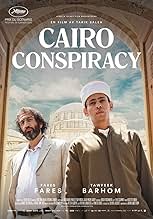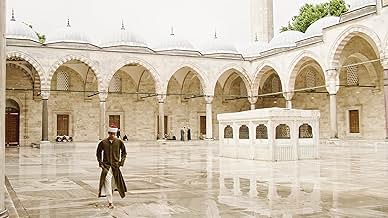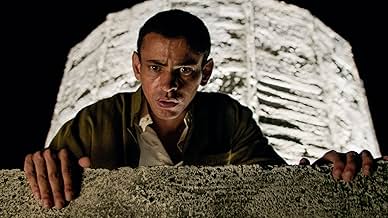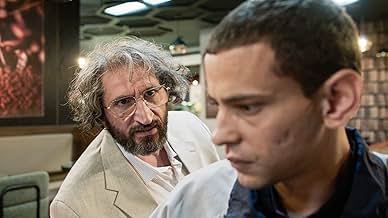IMDb RATING
6.9/10
8.7K
YOUR RATING
Adam, the son of a fisherman, is offered the privilege to study at the Al-Azhar University in Cairo, the center of power of Sunni Islam. Adam becomes a pawn in the conflict between Egypt's r... Read allAdam, the son of a fisherman, is offered the privilege to study at the Al-Azhar University in Cairo, the center of power of Sunni Islam. Adam becomes a pawn in the conflict between Egypt's religious and political elites.Adam, the son of a fisherman, is offered the privilege to study at the Al-Azhar University in Cairo, the center of power of Sunni Islam. Adam becomes a pawn in the conflict between Egypt's religious and political elites.
- Awards
- 5 wins & 21 nominations total
Mohammad Bakri
- General Al Sakran
- (as Mohamad Bakri)
Makram Khoury
- Blind Sheikh Negm
- (as Makram J. Khoury)
Ahmed Laissaoui
- Raed
- (as Ahmed Lassaoui)
Hassan El Sayed
- Village Imam
- (as Hassan El-Sayed)
- Director
- Writer
- All cast & crew
- Production, box office & more at IMDbPro
Featured reviews
Boy from Heaven is not an easy watch but it is unusual, inspiring and fascinating in its portrayal of a world unknown to most non-Muslims. It creates an atmosphere both sacred and threatening and the main character, in his tortured vulnerability and innate purity, is a compelling watch. It was by far my favourite movie at the Melbourne International Film Festival.
Every scene is rivetting as the plot becomes more and more dangerous for our young hero: life here is cheap and political influence all important. The film is a visual delight and the cinematography excellent. Above all, it is full of pauses and silence, reflective silence, giving the viewer time to catch their breath in the midst of the brutal reality of life at the spiritual university. This is truly a great movie!
Every scene is rivetting as the plot becomes more and more dangerous for our young hero: life here is cheap and political influence all important. The film is a visual delight and the cinematography excellent. Above all, it is full of pauses and silence, reflective silence, giving the viewer time to catch their breath in the midst of the brutal reality of life at the spiritual university. This is truly a great movie!
Tarik Saleh put his hand on a timeless aspect of Egyptian politics: the power interplay between the political leaders (the military) and the religious figures (Al Azhar). Never has this sensitive issue been addressed before. Which is ironically the very reason why this movie fails.
The reason why this issue was not addressed by Egyptian cinema (or "Hollywood-sur-Nil" as some used to call it back in its glamorous days) is simple: censorship. Egyptian moviemakers and actors would not be allowed to talk about this taboo. Indeed, this movie will not be played in Egyptian cinemas.
The direct consequence is that only foreign moviemakers can get away with making a movie that tackles this sensitive issue. And this is where things go wrong.
The movie - understandably - fails to capture any Egyptian essence. Dialogues are unnatural. Characters and attitudes are artificial. Add to this the fact that the cast is virtually Egyptian-free (for the reasons described above). They are therefore incapable of smoothing the dialogues into something that feels more natural.
While Tarik Saleh is from Egyptian descent, it is obvious from this movie that his relation to Egypt is, alas, too tenuous to make a movie that delves so deep into Egyptian social, political and religious realities.
Nevertheless, I am aware that my issue with this movie will only be shared by the Egyptian public. Therefore, to the extent that Tarik Saleh considers Boy from Heaven to be a a picture about Egypt by foreign filmmakers to foreign viewers, I would cut him some slack.
Still, the movie is riddled with espionnage clichés. Whichever you can think of, you will find in Boy from Heaven. Egyptian classical music is played at unlikely places. Scene transitions are often abrupt, evidencing issues with the montage.
More than once, the movie did feel like an average film school student's graduation project.
The reason why this issue was not addressed by Egyptian cinema (or "Hollywood-sur-Nil" as some used to call it back in its glamorous days) is simple: censorship. Egyptian moviemakers and actors would not be allowed to talk about this taboo. Indeed, this movie will not be played in Egyptian cinemas.
The direct consequence is that only foreign moviemakers can get away with making a movie that tackles this sensitive issue. And this is where things go wrong.
The movie - understandably - fails to capture any Egyptian essence. Dialogues are unnatural. Characters and attitudes are artificial. Add to this the fact that the cast is virtually Egyptian-free (for the reasons described above). They are therefore incapable of smoothing the dialogues into something that feels more natural.
While Tarik Saleh is from Egyptian descent, it is obvious from this movie that his relation to Egypt is, alas, too tenuous to make a movie that delves so deep into Egyptian social, political and religious realities.
Nevertheless, I am aware that my issue with this movie will only be shared by the Egyptian public. Therefore, to the extent that Tarik Saleh considers Boy from Heaven to be a a picture about Egypt by foreign filmmakers to foreign viewers, I would cut him some slack.
Still, the movie is riddled with espionnage clichés. Whichever you can think of, you will find in Boy from Heaven. Egyptian classical music is played at unlikely places. Scene transitions are often abrupt, evidencing issues with the montage.
More than once, the movie did feel like an average film school student's graduation project.
I like it when films shake the foundations of real life supremacy, this film is one of them. The subject matter is a hot topic and a very controversial one, which is why Tarik Saleh, the filmmaker, is persona non grata in Egypt, and the film was shot in Turkey although it is meant to portray the Azhar Mosque.
This is the story of Adam, the son of a fisherman who gets a letter of approval from the Azhar mosque to join their ranks, coincidentally the Imam. Trouble is brewing in the heels of appointing the next Imam!
This is a well made film with a well-made screenplay and memorable performances from the lead actor.
This is the story of Adam, the son of a fisherman who gets a letter of approval from the Azhar mosque to join their ranks, coincidentally the Imam. Trouble is brewing in the heels of appointing the next Imam!
This is a well made film with a well-made screenplay and memorable performances from the lead actor.
Fresh from a viewing of "The Nile Hilton incident", watching "Boy from heaven" consolidates the prowess of Tarek Saleh as a filmmaker: a robust and sensational story coupled with a minimalistic yet ever developing sense of flashy cinematography. This review is probably going to end up being a comparison between Saleh's newest film and his previous, so let's get the latter out of the way: "The Nile-Hilton incident" is a thriller crime film deeply rooted in the depiction of an Egyptian society that is on the brink of an Arab spring revolution. The story follows Fares Fares' character, a deeply corrupt cop who is assigned an investigation into a shady hotel murder that turns his life upside down. There are undoubtedly two things that should be said about this film: firstly, the story is pretty good! It is used as an apparatus to unravel the complexities of an Egyptian society in spiral, laden by crime, poverty and police corruption. However, a second point must be raised: the film lacks the kind of artistic and technical passages that tickle the imposter snob in me. It is very plainly shot and that can be said about hundreds of great films, but fortunately not about "Boy from heaven".
I never thought a red turban could have ever been this beautiful. This movie really superseded my expectations in terms of the cinematography while maintaining a solid loyalty to its great story. The film follows a young and candid young man who is chosen to enrol in the Azhar institute: an Islamic studies school that is regarded as a beacon of Islamic sciences in the middle east if not the world. But it is soon understood that this highly coveted institute hides behind it may dark secrets and political conflicts that rival in ruthlessness those inside the Egyptian quasi dictator regime. And Tawfeek Barhom's character finds himself in the middle of this highly volatile and dangerous battle between religion and state.
In this film, Tarek Saleh worked the religious imagery and the beauty of the spiritual ritual in a way that reminded me of Paolo Sorrentino's "The Young Pope": they both depicted in high detail the serenity of the religious system as well as its terrifying rigour. And Saleh got a few great shots of some red hats! Tarek Saleh has caught the eye of the international cinema community for quite a while, but now has cemented himself as one of the best directors in Egyptian cinema.
I never thought a red turban could have ever been this beautiful. This movie really superseded my expectations in terms of the cinematography while maintaining a solid loyalty to its great story. The film follows a young and candid young man who is chosen to enrol in the Azhar institute: an Islamic studies school that is regarded as a beacon of Islamic sciences in the middle east if not the world. But it is soon understood that this highly coveted institute hides behind it may dark secrets and political conflicts that rival in ruthlessness those inside the Egyptian quasi dictator regime. And Tawfeek Barhom's character finds himself in the middle of this highly volatile and dangerous battle between religion and state.
In this film, Tarek Saleh worked the religious imagery and the beauty of the spiritual ritual in a way that reminded me of Paolo Sorrentino's "The Young Pope": they both depicted in high detail the serenity of the religious system as well as its terrifying rigour. And Saleh got a few great shots of some red hats! Tarek Saleh has caught the eye of the international cinema community for quite a while, but now has cemented himself as one of the best directors in Egyptian cinema.
If you are not Muslim, chances are you never heard about Al Azhar, which is a university teaching the Islam Sciences since 970 in Cairo, Egypt. They are the ones electing the Great Imam, and have been fully independent from the government since the very beginning. Governments have tried to get into it for centuries, to no avail. The movie starts with the Great Imam dying, and the government's attempt to choose who will be the next one, preferably on the government's side. You follow Adam, a young man who just arrived from his small village to learn about Islam. He gets involved in a situation that gets worse with every decision he makes, but he somehow still continues to learn about Islam between his investigations, prayers, and lack of sleep. He seems like a very pious guy, not understanding what he is getting himself into, and looks lost most of the time. The movie is a bit slow however, and could have used a bit more rhythm or maybe just to be shorter.
Did you know
- TriviaA few days before the shooting in Egypt for The Nile Hilton Incident (2017) was supposed to take place, director Tarik Saleh was publicly removed from the country and told not to come back. As a result, that movie was shot in Casablanca, Morocco. As he's still persona non grata in Egypt, he couldn't shoot Cairo Conspiracy (2022) there, thus despite being set in Cairo, the film was actually shot in Istanbul, Turkey, mostly in the Süleymanye mosque.
- ConnectionsFeatured in Il était une fois...: La conspiration du Caire (2024)
- How long is Cairo Conspiracy?Powered by Alexa
Details
- Release date
- Countries of origin
- Official sites
- Language
- Also known as
- Boy from Heaven
- Filming locations
- Production companies
- See more company credits at IMDbPro
Box office
- Budget
- €6,500,000 (estimated)
- Gross worldwide
- $4,867,691
- Runtime2 hours 6 minutes
- Color
- Sound mix
- Aspect ratio
- 2.39 : 1
Contribute to this page
Suggest an edit or add missing content






























